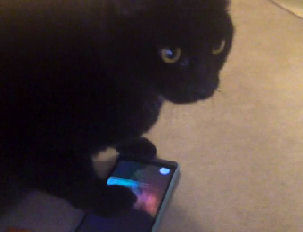
Delphi
"In the beginning man created the computer," the instructor monotonously intoned, "and people saw that it was good."
History! Cassandra Van Der Post thought, rolling her hazel eyes with frustration. How boring! I don't know why I have to learn all this. It's not as though I'll ever use any of this information.
Still, someone wiser than she once deemed it necessary, so the young girl had no option but to learn it. A conscientious student, she gave it her best effort to listen attentively even though she found the history of technology about as interesting as the discovery of DNA, the evolution of an earthworm or the invention of the wheel.
"And then man decided that the huge mainframes ought to be replaced with smaller and more powerful computers and that they were to be made available to everyone. And the people saw that this, too, was good."
Cassandra suppressed a yawn and tried to fight the mounting boredom she felt.
"And then came the Internet. Like the most revered Abraham Lincoln ...."
Who is Abraham Lincoln? she wondered.
"... it set people free. Suddenly, nearly everything they wanted or needed was available at their fingertips. They turned to their computers for education, entertainment, shopping, communication—even dating."
What's dating?
"It made an impact on the world just short of that made two thousand years earlier by the birth of Jesus Christ."
Who?
"Things began to change at leaps and bounds from that point on. The personal computer begat the smartphone, tablets and computerized watches, and they begat apps."
Apps. Finally, something I've heard of!
"The makers of the tablets and smartphones told the app developers to be fruitful and multiply their output. Over time, hundreds of thousands of apps became available for download. And people saw this and knew it was good.
"They and their smartphones soon became inseparable. Not only could they talk and message friends, but they could also take photographs, play games, watch videos and listen to music. Other products, working in conjunction with app developers, made it possible for people to turn out their lights, turn on their appliances, unlock their doors and start their cars with their phones. Thanks to handy apps, there was no longer any need for books, music players, televisions, keys, flashlights, clocks, calendars or maps."
By this time, Cassandra's boredom was replaced by frustration. The instructor's use of so many unfamiliar words made it hard to follow what was being said.
Books. Television. Keys. Flashlights. Clocks. Maps.
Give me a break! A person my age doesn't have that large a vocabulary of antiquated terms and phrases.
"And along came social media. Friendster begat Myspace, and Myspace begat Facebook, and Facebook begat Twitter. They begat Instagram, Snapchat, reddit, Flickr ...."
The list went on and on.
In claiming one social media app gave birth to another, the instructor was not strictly adhering to the facts—ironically enough, a common practice with social media posts—but the students would not know the difference.
"Eventually, computers, tablets and smartphones fell out of fashion and became as obsolete as horses and buggies. After all, why did anyone need bulky hardware when cerebral implants were so much more efficient?"
Cassandra knew very little about the chip in her own brain since it had been put there soon after her birth. The majority of people gave their implants little thought—much like an appendix or tonsils, they simply took them for granted.
"It was then, amidst the vast profusion of apps that threatened to overload the entire integrated network that all life on Earth had come to rely on for its very survival, that man's greatest achievement was reached: Delphi."
The word brought an involuntary smile to Cassandra's lips and a sparkle to her eye. Now that she was fifteen years of age, she would be granted unfettered access to Delphi. It was the reason she was currently undergoing instruction since international law required everyone to know how to properly use the all-powerful app.
From that point on in his lesson, the instructor sounded less like a pedantic teacher and more like an over-enthusiastic, old-fashioned salesman putting forth a pitch to convince potential customers to purchase his product.
"With Delphi, all your needs will be at your fingertips."
This statement was a misnomer since Delphi's features would be accessed directly by a person's brainwaves, not his or her fingers.
"It is a marvel of man's achievement: complete virtual reality. Sights, sounds, smells, tastes, physical sensations: they can all be simulated by Delphi. As was the case with the antiquated social media services, all users have their own personal space where they can store visual and audio records as well as post thoughts and opinions."
As the instructor continued to enumerate the many advantages and attractive features of the all-encompassing app, Cassandra felt her impatience grow.
Come on! Hurry up and finish already. I can't wait to start using it.
"Best of all," the instructor said, finally nearing the end of the history portion of the lesson. "Thanks to Delphi's Gemini component, you can enjoy the full range of features without their interfering with your day-to-day activities."
Although the teenager could not begin to fathom how Gemini functioned, Cassandra knew it basically divided a person's brain into two separate levels of consciousness. In the days before the advent of Delphi, a person could keep his eyes on the road as he drove a car, while at the same time his mind conjured up images of spending the day at the beach. Gemini made the separation between the two levels more distinct and gave the user more control over them both.
"And now that the history lesson is over, it brings us to the most important aspect of your education," the instructor announced. "I will now tell you how to safely and effectively operate the Delphi app."
It's about time!
What followed next was roughly half an hour of detailed instructions and troubleshooting techniques to be used should the app experience a rare malfunction.
"And that concludes your state-mandated training," the computerized teacher announced at long last. "Installation of the Delphi app will commence in ten seconds. Goodbye and good luck to you."
The instructional program ended, and the powerful computer chip in Cassandra's cerebrum began running delphi.exe, at the same time deleting all other files including the educational program that had just finished running.
* * *
The morning after celebrating her fifteenth birthday Cassandra Van Der Post reported to the state's Office of Employment for assignment. Now that she had a fully functioning Delphi app, she was ready to leave behind her childhood and take her rightful place in the workforce.
All the while writing reviews of restaurants she had never eaten at, rating products she never purchased and posting photographs of places she had never been to, the worker at the Office of Employment checked current service levels for available openings. Since help was needed in food production, she sent the young girl to the Department of Sustenance. As the teenager rode a horizontal conveyor belt to the multi-passenger vehicle that would take her to the job site, she sent texts to people she did not know and read those sent to her from people she had never met because they simply did not exist.
Cassandra's first day at work set the pattern for all the years that followed. On the basic level of existence, she functioned adequately, carrying out all her responsibilities without error. On the enhanced level, made possible by Gemini, she enjoyed a full—if completely fabricated—life on her personal space in the cyber world.
Delphi had fulfilled the promise of early social media sites by making Cassandra and billions of other people, young and old alike, the centers of their own little universes in which imaginary people read the comments they wrote, cared about the opinions they held, shared their beliefs and agreed with their likes and dislikes. In reality, however, the people of Cassandra Van Der Post's generation were little more than robots, performing monotonous but necessary tasks to keep the human race alive.
Yes, the Delphi app had undoubtedly changed the world. But like Mary Shelley's Dr. Frankenstein it had created a monster.
On the bright side, it had put an end to war, crime, poverty and disputes between both individuals and entire nations. However, it had done these great things at the expense of the people it was meant to benefit, for the human race had lost their ability to feel real emotions, think actual thoughts, form valid opinions and live meaningful, productive lives. They relinquished control of their minds and their actions to a computer app and remained blissfully ignorant of what they had lost.

Unfortunately no one has yet to create an app that can turn Salem off!


